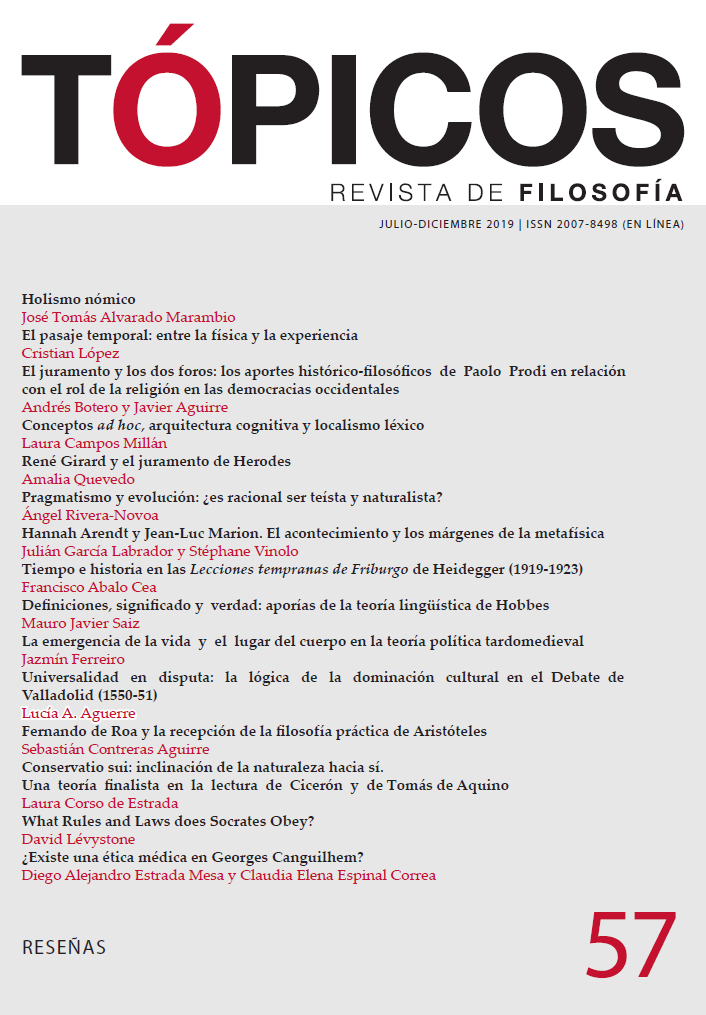Publicado 2019-06-29
Palabras clave
- aturalismo,
- Edad Media,
- cuerpo,
- biopolítica
Cómo citar
Resumen
Los estudios historiográficos han dado sobrada cuenta del antecedente naturalista de la teoría política medieval, resultado de la incorporación de tesis aristotélicas con la recepción de la Política. El objetivo de nuestro trabajo es hacer una hermenéutica de ese naturalismo tomando como hilo conductor al cuerpo como aspecto de la constitución humana que impone ciertas necesidades y del que emergen ciertos impulsos que determinan su condición social y política. En particular, analizaremos en los tratados De regno ad regem Cypri de Tomás de Aquino y Defensor pacis de Marsilio de Padua cómo la emergencia de la vida y la noción de cuerpo cobra protagonismo por ser la sede de una serie operaciones determinantes para la vida.
Referencias
- Tomás de Aquino
- Sancti Thomae de Aquino. (1979). De Regno ad Regem Cypri. En H. F. Dondaine (ed.), Opera omnia iussu Leonis XIII. Roma: Editori di San Tommaso.
- St Thomas Aquinas. (1949). On Kingship to the King of Cyprus. G. B. Phelan. (trad.), I. TH. Eschmann. (int. y notas), Canadá: Pontifical Institute of Mediaeval Studies.
- Tomás de Aquino. (2003). Del reino. A. Tursi (trad.), Buenos Aires: Losada.
- Marsilio de Padua
- Marsilius von Padua. (1932). Defensor pacis. Hannover: Herausgegeben von R. Scholz.
- Marsilius of Padua. (1928). The Defensor Pacis of Marsilus of Padua. C. W. Previté-Orton (ed.), Cambridge.
- Marsilio de Padua. (1989). El defensor de la paz. L. Martínez Gómez (est. prel., trad. y notas), Madrid: Tecnos.
- Bibliografía
- Agamben, G. (2002). Homo Sacer I. El poder soberano y la nuda vida. A. G. Cuspinera (trad.), Madrid: Editora Nacional.
- Arendt, H. (2010). La condición humana. R. G. Novales (trad.), Buenos Aires: Paidós.
- Black, A. (2003). Church, State and Community: Historical and Comparative Perspectives. United Kingdom: Ashgate Variorum.
- Castello Dubra, J. (1997). Nota sobre el Aristotelismo y el Averroísmo político de Marsilio de Padua. Veritas, 42, 671-677.
- Coleman, J. (2000). A History of Political Thought. From the Middle Ages to the Renaissance. USA: Blackwell.
- Ferreiro, J. (2004). La recepción del Aristóteles político en el De Regno de Tomás de Aquino. En A recepcao do pensamiento Greco- Romano Árabe e Judaico pelo ocidente medieval. (pp. 409-420). Porto Alegre: EDIPUCRS.
- ---- (2017). Tensiones entre physis y nómos en la teoría de la pólis de Aristóteles. Revista Jurídica Digital Uandes, 1, 2, 92-108.
- Foucault, M. (2005). Historia de la sexualidad: la voluntad de saber (1976). U. Guiñazú (trad.), Buenos Aires: Siglo XXI Editores.
- Habermas, J. (2000). Teoría y praxis. Estudios de filosofía Social. Madrid: Tecnos.
- Morin, A. (2005). Las referencias corporales en el De regno de Tomás de Aquino. Argos, 29, 69-89.
- Mulieri, A., (2018). Marsilus of Padua and Peter of Abano: the Scientific Foundations of Law-making in Defensor Pacis. British Journal for the History of Philosophy, 26, 2, 276-296.
- Nederman, C. (1996). The Meaning of Aristotelianism in Medieval Moral and Political Thought. Journal of the History of Ideas, 57, 4, 563-585.
- ---- (2004). What is Dead and What is Living in the Scholarship of Walter Ullmann. En Pensiero Politico Medievale, 2, 11-19.
- Quillet, J. (1970). La philosophie politique de Marsile de Padoue. París: Librairie Philosophique J. Vrin.
- Shogimen, T. (2007). `Head or heart?´ Revisited: Physiology and Political Thought in the Thirteenth and Fourteenth Centuries. History of Political Thought, 28, 2, 208-229.
- ---- (2011). Medicine and the Body Politic in Marsilius of Padua’s Defensor Pacis. En G. Moreno-Riaño y C. J. Nederman (eds.), Companion to Marsilius of Padua. (pp. 71-115). Leiden: Brill.
- Schneider, J. H. (2003). La filosofía política en el De regno de Tomás de Aquino. Patristica et Mediaevalia, 24, 3-27.
- Syros, V. (2012). Marsilius of Padua at the Intersection of Ancient and Medieval Traditions of Political Thought. Toronto: University of Toronto Press.
- Tursi, A. (2005). El hombre, un animal social y político, en las consideraciones medievales: -Tomás de Aquino y Juan Quidort de Paris. Deus Mortalis, 4, 9-30.
- Ullmann, W. (1985). Principios de gobierno y política en la Edad Media. Madrid: Alianza.






